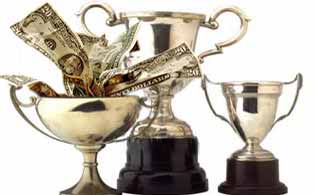 Yesterday’s post on the reversible random number generators received some interesting reactions from my colleagues. They were uniformly impressed with the solution to what everyone thought was a hard problem, but surprisingly, most of the scientists I talked to were most excited about the fact that dangling a $500 reward for solving a hard problem generated nearly instantaneous results. Typical comments:
Yesterday’s post on the reversible random number generators received some interesting reactions from my colleagues. They were uniformly impressed with the solution to what everyone thought was a hard problem, but surprisingly, most of the scientists I talked to were most excited about the fact that dangling a $500 reward for solving a hard problem generated nearly instantaneous results. Typical comments:
I wonder if I similarly spent my startup how much science I could get done…
Also, it is amazing what $500 buys these days!
Think how many problems we could solve if we dangled a few prizes for other knotty problems.
So what made this work?
- The problem itself was well-framed and finite: “We need a time-reversible random number generator.” It was something that a lot of people in the field could agree was interesting when framed to them properly.
- The group offering the prize was widely-respected for previous work on related problems.
- The prize and the solution were both posted on a highly visible physics site (arXiv).
- The reward was about fame and recognition by the community more than it was about money.
I’m now wondering if all of the attempts to get a kickstarter or crowdsourced funding model for science (e.g. sciflies, petridish, scifundchallenge, fundageek) are just a bit misguided. Science is darned expensive, and for better or worse, we’re going to be wedded to federal and foundation funding for science for a long time. All funding models have an aspect of salesmanship to them – a scientist must convince the funder that the problem itself is interesting enough to need solving, and that their lab is the one to solve it. In the NSF-style funding model, scientific communities do have significant input into what the “good problems” are, but the necessary delays in funding and the scarcity of funds means that we’re not very agile.
Perhaps we need a clearinghouse where scientific communities can agree on a tough challenge, pool some minimal award money (like $500 or $1000) and let their young colleagues have a go at winning fame by solving them.
